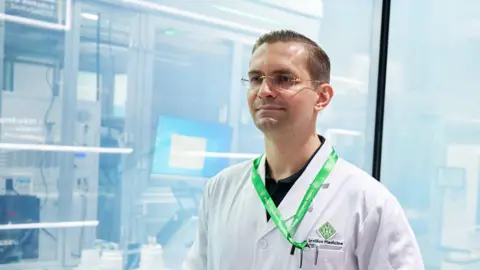 Insilico Medicine
Insilico MedicineThis is the fourth feature in a six-part series that is looking at how AI is changing medical research and treatments.
Over a video call, Alex Zhavoronkov holds up a small, green, diamond-shaped pill.
It has been developed by his company to treat a rare progressive lung disease for which there is no known cause or cure.
The new drug has yet to be approved, but in small clinical trials has shown impressive efficacy in treating idiopathic pulmonary fibrosis (IPF).
It’s one of a new wave of drugs where artificial intelligence (AI) has been integral to its discovery.
“We can’t say we have the first AI discovered and designed molecule approved,” says Dr Zhavoronkov, the co-founder and CEO of US-based start-up Insilico Medicine. “But we may be the furthest along the path.”
Welcome to the great AI drug race, where a host of companies are employing the power of AI to do what has traditionally been the job of medicinal chemists.
That includes both smaller, specialist AI-driven biotech companies, which have sprung up over the past decade, and larger pharmaceutical firms who are either doing the research themselves, or in partnership with smaller firms.
